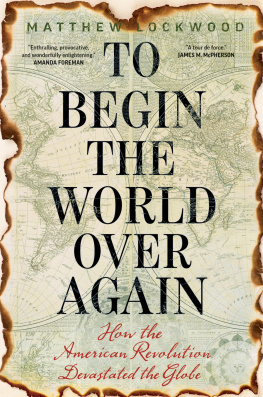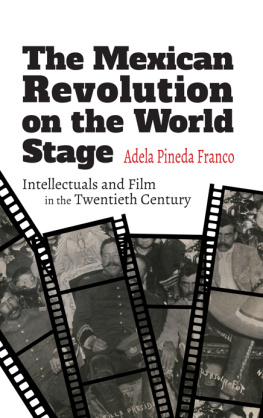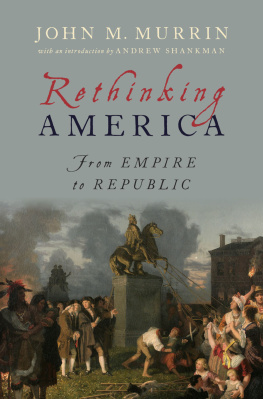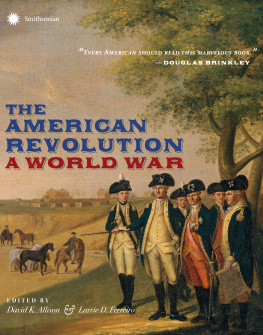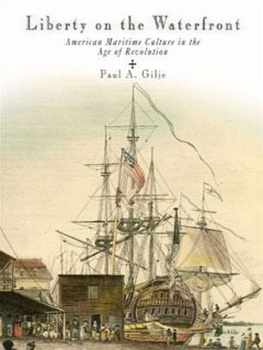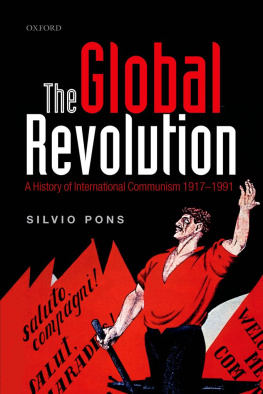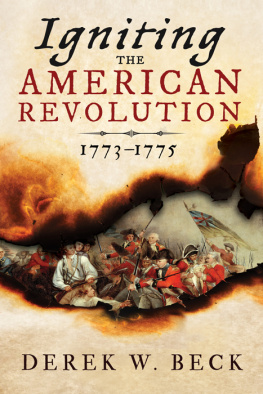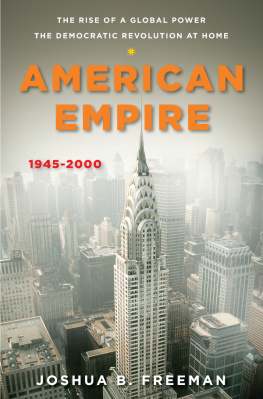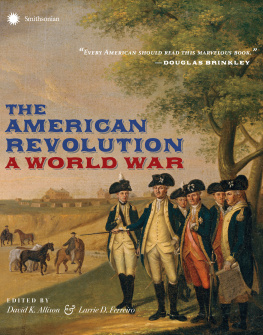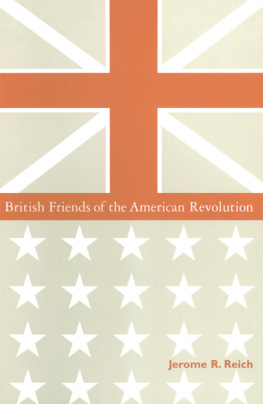TO BEGIN THE WORLD OVER AGAIN

Published with assistance from the Annie Burr Lewis Fund.
Copyright 2019 Matthew Lockwood
All rights reserved. This book may not be reproduced in whole or in part, in any form (beyond that copying permitted by Sections 107 and 108 of the U.S. Copyright Law and except by reviewers for the public press) without written permission from the publishers.
For information about this and other Yale University Press publications, please contact:
U.S. Office:
Europe Office:
Set in Fournier MT by IDSUK (DataConnection) Ltd
Printed in Great Britain by TJ International Ltd, Padstow, Cornwall
Library of Congress Control Number: 2019941057
ISBN 978-0-300-23225-7
A catalogue record for this book is available from the British Library.
10 9 8 7 6 5 4 3 2 1
For Lucy
CONTENTS
ILLUSTRATIONS
ACKNOWLEDGMENTS
I wrote my first book, a hand-illustrated history of Sparta, for a school assignment when I was ten. With the confident solipsism of youth, I ignored the help I had received from my teacher and my parents and dedicated the book to myself, because I wrote it. Thankfully, experience brings a degree of humility. Over the years I have learned that writing and publishing a book would be impossible without the contributions of scores of people, from friends and family to colleagues, archivists, agents, editors, reviewers, designers, and publicists. I have thus acquired more debts in writing this book than my ten-year-old self could have ever imagined.
The book was begun in New Haven, where I was a fellow at the Yale Center for the Study of Representative Institutions, and has followed my academic wanderings to the University of Warwick and my present home at the University of Alabama. This book would not have been possible without the institutional support offered by these universities or the rich intellectual environments created and fostered by my colleagues at Yale, Warwick, and Alabama. Special thanks to Keith Wrightson, Steven Smith, Dan Branch, Peter Marshall, Mark Knights, Mark Philip, and Josh Rothman for making each institution an intellectual home.
The book only really took on its present form after a series of sparkling conversations with Bill Hamilton, my agent at A.M. Heath. Bill rescued the kernel of a good idea from the slagheap and helped polish it until it was fit for consumption. His steady hand, deep knowledge, and probing questions have shaped and reshaped this book from its inception. In many ways, this book was forged in Bills Socratic crucible.
Julian Loose, my editor at Yale University Press, believed in this book from the start and has expertly guided its construction. His keen judgment, unfailing acuity, and unflagging energy have worked wonders beyond measure. Marika Lysandrou, Rachael Lonsdale, Percie Edgeler, and the anonymous readers at YUP have all helped to transform a chaotic manuscript into a sharper intellectual endeavor and a wonderful physical product. That they have made the oft-frustrating publishing process smooth and enjoyable is a testament to their skill.
My friends and family have spent the last few years suffering through my latest obsession. This book would look very different without the input and support of Keith Wrightson, Richard Huzzey, Justin duRivage, Amanda Behm, Sarah Miller, Jamie Miller, Megan Cherry, Charles Walton, Steve Hindle, Lawrence Cappello, Margaret Peacock, Erik Peterson, John Beeler, my brothers Jack, Kaleb, John, Joey, and Josh, my delightful in-laws Caitlin, Emma, Eric, Donald, and Wendy, and my parents, Jack and Nancy.
As ever, Lucy Kaufman deserves my perpetual and eternal gratitude. An intellectual whirlwind with the patience of a saint, Lucy read and edited the entire manuscript, line by line, word by word, more than once, expertly hacking away at its initial monstrosity until a book at last emerged. She did not simply listen to my incessant droning, but constantly, brilliantly, engaged with my ideas and my writing. Her insight, vision, and forbearance are of truly Herculean proportions. This book, and I myself, would be nothing without her. This book, and all past and future books, is for her.

INTRODUCTION
THE WORLD THE AMERICAN
REVOLUTION MADE
We have it in our power to begin the world over again.
Thomas Paine, Common Sense
Revolutions have never lightened the burden of tyranny; they have only shifted it to another shoulder.
George Bernard Shaw, Man and Superman
In 1779, after a month-long journey across Europe, through the Mediterranean Sea, across the Sinai Desert, and down the Red Sea, after weeks on a crowded ship in the storm-tossed Indian Ocean, Eliza Fay arrived on the sun-kissed shore of Malabar in south India. The tropical tranquility that greeted Eliza and her husband Anthony after their trying ordeal was, however, a mirage. With war spreading from the Atlantic to the subcontinent, the British embassy had fled, leaving Eliza and Anthony at the mercy of William Ayers, an English convict and one-time soldier now employed by the ferociously anti-British Sultan of Mysore. As Ayers escorted the pair to prison, Eliza Fay must have wondered just how she had come to such a pass. In the years to come, tens of thousands of captives and refugeesMuslims, Hindus, and Indian Christians as well as countless British, French, and Indian soldierswould ask themselves similar questions. The answer lay not in Malabar, but in an unexpected source: the American Revolution.
On May 18, 1781, Micaela Bastidas stood in the square in Cuzco in a pool of her own sons blood defiantly awaiting her fate. Her rebellion against the Spanish Empire had failed and so now, as her husband Tupac Amaru II, co-leader of the uprising, looked on in horror, it was her turn to face the executioner. At least she would be spared the awful sight of what the Spanish had planned for her husband. After her death he would be pulled apart by horses, then quartered and beheaded, his limbs sent across Peru as symbols of Spanish vengeance. With her death, and the death of her husband, an indigenous rebellion would end, but a spark had been lit and a pair of martyrs had been born. Their fates too were rooted in the struggle for American independence.
In 1810, Britains first Indian restaurant, the Hindoostane Coffee House, opened its doors in George Street in London. Entering the establishment, patrons might well have thought themselves transported to the Orient itself. Reclining on bamboo-cane sofas, guests gazed upon walls covered with rich paintings of Indian landscapes and scenes of Indian life. As the aroma of curries and seasoned rice wafted in from the kitchen, the scent of Indian herbs and spices mixing with the fragrant tobacco of the ornate hookahs lining the floor of the smoking room, India gentlemen, Britons who had lived and worked in India, must have harkened back to their previous lives half a world away.
With Britains ever-expanding empire and its growing involvement in the affairs of the subcontinent, it was perhaps no surprise that such an establishment might grace the crowded streets of the imperial capital. Its proprietor, however, was no British nabob newly returned from plundering the crumbling empires of the east, no British soldier hoping to recreate the sights, smells, and tastes of his formative years, no British merchant hoping to expand his interests from shipping spices to cooking with them. Instead, as an advertisement in The Times made clear, the restaurant was owned and operated by Dean Mahomet, a Muslim Bengali soldier from Patna and his Irish Protestant wife. The more literary among the advertisements readers may well have recognized the proprietors name. Nearly two decades earlier, the very same Dean Mahomet had been involved in another first, becoming the first Indian to publish in English when his
Next page
